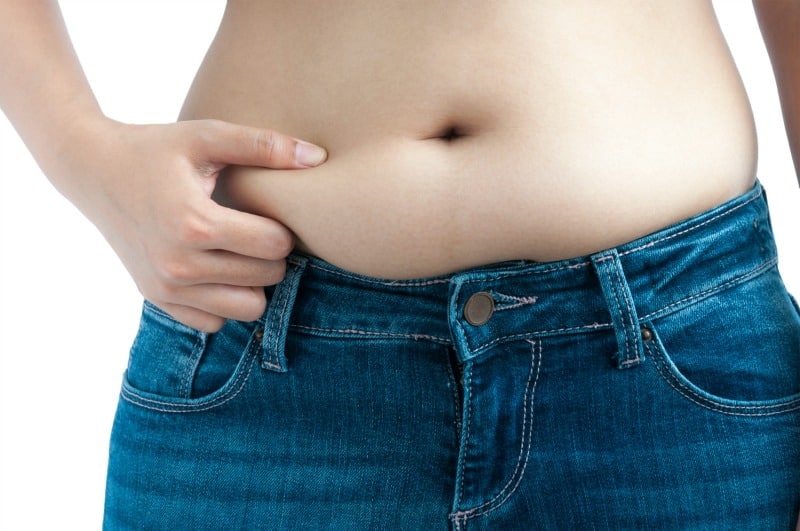Most women in the United States hit menopause around age 51. A smaller number can reach it as early as 40 or as late as their late 50s. If you are in your 40s, maybe you’re starting to forget where you left your keys and your face turns beet red for no apparent reason. Or maybe you’re kept up at night by relentless insomnia or hot flashes. Menopause, here we come. We can burst into tears and blame it on the hormones or we can be prepared by knowing the signs and symptoms of menopause and how best to handle them. (Or, a little of both.) Here are the ten most common menopause symptoms and our solutions for helping you treat them. Knowledge is power, and when you’re armed with these tips, it makes navigating menopause a little bit easier.
1. The not-so-hot-HOT FLASH.
More than half of menopausal women experience hot flashes. Without warning, your skin gets warm and you feel a rush of heat spread over your body. You get flushed or red and it shows up on your face. You can have a hot flash that is mild or one where you feel like your body is on fire. Good times, right? Hot flashes are your body’s way of reacting to a decreased supply of the hormone estrogen which naturally occurs when women approach menopause. If you decline in estrogen gradually, you may be lucky enough to escape hot flashes, but if your ovaries stop estrogen more abruptly, hot flashes may be more intense. I had an experience in the airport on a below zero day where I went into hot flash overdrive. Stripped down to my cami top, I was getting stares from everyone around me wearing their down jackets. Truth be told, I’m always cold so sometimes I’m okay with being a little warmer but Murphy’s Law means your hot flash will happen at the most inopportune time.
HOW TO DEAL: If you’re going to get hot flashes, you probably can’t avoid them altogether, but you can try to avoid the triggers that bring them on. To prevent hot flashes avoid stress, caffeine, alcohol, spicy foods, tight clothing, heat and cigarette smoke. Need more helpful hints? Keep a cool bedroom, meditate or practice deep breathing during the onset of hot flashes, exercise daily and consider buying a chill pillow to lay your head on at night. A friend tipped me off to these Hot Girl Pearls. She warned me they are large (like Wilma Flintstone size), but they work. We also love these Nano-Ice Cooling necklaces; they come in a variety of colors and are super cute.
2. The not how you like to sweat, NIGHT SWEATS.
If you haven’t had a night sweat, think of it as a hot flash over-achiever. Night sweats are more intense hot flashes that come with bouts of sweating. Night sweats happen because of a hormonal imbalance, but a hot bedroom or heavy bedding can make them worse. Night sweats vary in severity but can disrupt sleep. I used to go to bed in the winter wearing long underwear and socks; now, even on the coldest evenings I want a fan on me and I’m wearing a tank top and shorts. And, those nights when you wake up in a pool of sweat and have to change are no fun for anyone.
HOW TO DEAL: First, talk to your doctor to make sure there isn’t another underlying medical cause of your night sweats. If it’s all menopause, treat night sweats with regular exercise, a cool bedroom (use a fan or ceiling fan), wear sweat-wicking pajamas (same material as your hiking attire) or consider a natural course with herbs and supplements such as black cohosh (talk to your naturopath-there are varying opinions on black cohosh.) For me, a fan at night helps. And when I keep my body alkaline by drinking lemon water throughout the day I just seem to do better hormonally. Also, be sure you’ve got sheets and pajamas that allow your body to breathe while you sleep!
3. The “Are you serious?” HAIR LOSS moment.
It takes the blue ribbon for the most obvious menopause symptom and the blue ribbon for hard-to-ignore: hair loss. It’s caused by estrogen deficiency because hair follicles need estrogen to sustain hair growth. Hair loss may be sudden or gradual, or you may notice your hair just gets dry, thinner, and more brittle. And what I’ve noticed is the gray hair (I’ve got lots of it!) is a different texture and wirey. I know some of you can agree with me that going grey and getting thinner hair all at once is a double-whammy of menopause unpleasantness. (Add OTHer ICE COOLING NECKLACE)
HOW TO DEAL: You can help prevent hair loss by keeping your stress levels in check, eating lots of fish and healthy fats, taking your multivitamin, exercising, drinking lots of water and avoiding heat treatments (like blow drying and flat irons). As a now 50-year-old woman with 70 percent gray hair, I do use bleach to keep my hair blonde. So I choose to do a deep conditioner once a week and avoid headbands and hats that have elastic in them and pull at my hair. I found a great product at Ulta to touch up my roots in-between colors: WOW. It’s a powder that just brushes on easily unlike some of those hair mascaras that are sticky. I’m also a fan of dry shampoo to avoid over-washing my hair and drying it out. Overall, I’m so much more careful with my hair than I used to be.
4. The “I am on top of the world”; “I am so irritated” MOOD SWINGS.
Call it what you will: mood swings, irritability, agitation, anxiety. Menopausal mood swings are common and can be hard to deal with because your mood can change so rapidly. One minute you’re bursting with joy and the next you are cursing the dog or sobbing at a sappy commercial. The severity and frequency of mood swings vary from woman to woman, but they are caused by those darn hormonal imbalances. And if you aren’t sleeping well, that can exacerbate the swinging of your moods.
HOW TO DEAL: To treat those menopausal mood swings, make sure you get enough vitamin B-12, including shellfish, (clams, mussels and crab) salmon, lean beef, low-fat or fat free milk and eggs. A daily multivitamin also provides the recommended amount of B-12. In addition, I don’t have to tell you that a CLEAN diet in general will be your best ally. Try avoiding added or fake sugars, chemicals, preservatives, and food coloring.
5. The “I am dragging” SENSE OF FATIGUE.
Fatigue is one of the most common menopause symptoms and it’s often described with words like: weak, dragging and low energy more so than sleepy. You also may notice that your attention span isn’t what it used to be (lack of concentration can be a whole symptom of its own). You won’t be surprised to hear fatigue is also caused by drops in estrogen levels and it can have a big impact on your life; you may no longer be a productivity goddess or Ms. Energy.
HOW TO DEAL: Beat menopause-related fatigue by eating healthy, establishing a regular wake up and bedtime routine, sleeping on a comfy mattress, keeping your bedroom dark and cool, using your bed for only sleep and sex, refraining from eating two hours before bedtime, and avoiding caffeine, nicotine and alcohol. Phew! That’s a tall order, I know.
6. The “Why am I in this room?” MEMORY LOSS moment.
So, you used to retain everything in your head, huh? And now you can’t. Yep, it’s happened to me. Women sneaking up on menopause often experience memory loss, lapses, and an inability to focus. If you drive yourself bananas by entering a room and forgetting why you are there, or not remembering your last discussion with someone, you may be experiencing a normal symptom of menopause. If you have low levels of estrogen and high stress, memory loss is even more likely. My girlfriends and I laugh about helping each other finish their sentences.
HOW TO DEAL: While there is no clear cure to fight menopause-related memory loss, you can take on new and interesting challenges. Use your mind in different ways: solve a crossword puzzle, learn a musical instrument or play a new sport. Play chess, read more books, or just challenge your brain in a new way. The app “Lumosity” is great for stimulating your mind and keeping those neurons firing!

7. The “I could take it or leave it,” LOSS OF LIBIDO.
Every person experiences natural ebbs and flows in desire, but if your sex drives takes a nose dive, the sudden drop may be due to menopause. Hormonal imbalances (mainly androgen deficiency) can cause a loss of libido. Other factors can contribute to a low sex drive like vaginal dryness, depression, prescription medication and relationship issues. Some of the other symptoms of menopause like hot flashes and insomnia can hinder desire too.
HOW TO DEAL: Evaluate any medications you’re taking with your doctor to see if they are contributing to a decreased libido. Treat vaginal dryness if that’s an issue. Take time for intimacy by scheduling time together away from daily stressors. Seek couples therapy if there are underlying marital or relationship issues you think are contributing to your loss of desire. I find that it’s important to step away from stress every once in a while and just spend happy time with your spouse or S.O!
8. The wait a minute … is a MISSED PERIOD a bad thing?
Oh, great, you just got your period after not having it for two months—right before a special event. Ugh. Irregular periods can happen at any time due to stress, weight fluctuations and a host of other factors. During perimenopause, irregular periods are quite common. If you are between 40 and 50, you may experience shorter or longer periods and irregular cycles. You may even miss a period! Hormonal imbalance might cause lighter or heavier than usual bleeding. Spotting between periods is normal too. Decreased levels of estrogen and progesterone cause the irregularities. I went 8 months without a period and thought I was in the clear and then, HELLO, it showed up again!
HOW TO DEAL: Well, you can’t command your body to stay on a schedule. So, just don’t worry. If you are between the ages of 40-50 your irregular cycle and period is likely due to perimenopause, and there isn’t a lot to do about it. You could, if you choose, decide to be excited for the no-more-period hassle ahead.

9. The “Where did my abs go?” WEIGHT CREEP.
Weight gain, specifically around your waist, is another sign of changing hormones levels during menopause. Those shifting levels may influence weight gain and redistribution of fat. Low testosterone levels can contribute to a decreased metabolic rate, so that in turn can cause weight gain.
HOW TO DEAL: Keep your metabolism revved by doing strength-training workouts—the more muscle you have, the more calories you burn at rest. Embrace a healthy lifestyle by eating clean, exercising regularly, moving more and drinking plenty of water. Try Pilates workouts that focus on the core, too.
10. The not you again—HEADACHE.
Maybe you are one of those women who glances at the calendar to see when your period is coming so you can avoid red wine, aged cheese and stress to prevent getting a debilitating migraine with your period. The reason migraines and headaches are so common during our monthly cycles is due to estrogen levels plunging before our menstrual cycle. So when menopause hits and your estrogen production slows down, you may experience headaches once again.
HOW TO DEAL: If you get migraines or they run in your family, talk to your doctor about avoiding triggers or possible medications. If you’re trying to prevent headaches, make sure you always drink enough water, find healthy ways to reduce your stress and avoid any known triggers like not getting enough sleep. Also, there’s some good news: once you go through menopause and your hormonal levels get more consistent and remain low, your headaches may go away. It’s the rapid fluctuation of hormones that typically cause headaches.
Yes, menopause is just one of those things we can’t avoid. You can, however, champion through it like the empowered woman you are—full of knowledge and taking action to reduce its impact on your life.

5 Comments
S on February 25, 2020 at 1:44 AM
Try sage tea
NLG on December 9, 2018 at 8:51 PM
I wish I had looked for additional articles regarding perimenopause and/or menopause and sticky skin after last summer, then maybe I could have helped others! Many people think that sticky skin is sticky sweat, but it's not. I have sticky skin after washing my hands in cold water, so sweat is not the issue! I have not gone to traditional doctors in a long time due to trust issues and the lack of bedside manners with most so I don't know if HRT can help, but I am considering it. What I have found to give me some relief in the mean time is using supplements. If you can find a holistic/homeopathic practitioner, maybe they can help determine what you need. We think that for me, it's been Core Milk Thistle but we are not certain since that supplement is for liver support (my liver is healthy by the way, we check this all the time). I do find when I am taking it, my sticky skin can decrease. And I shower with Neutrogena's "Body Clear Body Wash", it has salicylic acid, which tends to help with some relief.
Renee McCoy on March 3, 2017 at 6:55 AM
Sticky skin feeling help?Renee
Lynne on January 12, 2017 at 2:07 AM
Not helpfull, I've tried everything for the last 15 years am still having atrocious day and night sweats
Heidi on November 6, 2014 at 8:04 PM
These sound awesome and way too easy! Curious though...no adding water/oil/milk/egg to either of the two recipes? Thanks!